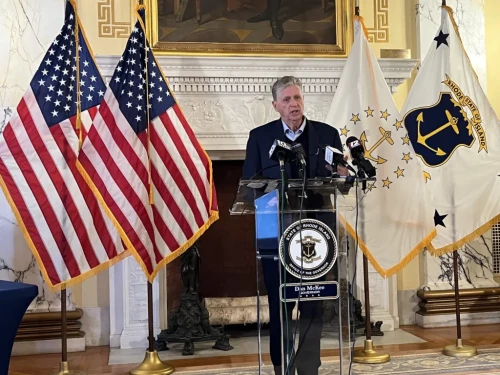The president of Brown University finally broke her silence on Friday over the latest set of White House demands, which some campus critics say pose a threat to academic freedom.
In an open letter addressed to the “Brown Community,” Christina H. Paxson wrote, “We need to decide, as a community, how or whether to respond.”
On October 1, the Trump administration invited nine universities – including Brown, Dartmouth, and the University of Pennsylvania – to sign a document called the Compact for Excellence in Higher Education.
The new demands are above and beyond the concessions Brown already made when it signed a $50 million voluntary agreement with the White House over the summer to unfreeze $510 million dollars in NiH grants.
The White House set an October 20 deadline for universities to respond. In her open letter, Paxson invited faculty, students and alumni to share their thoughts and concerns.
“In this moment, I feel strongly that it is most helpful to hear from members of our community,” she wrote.
Paxson is already getting an earful.
On Thursday, protesters held a rally at the Van Wickle Gates, the main entrance to campus.
Several faculty members who attended wore full academic regalia. Timmons Roberts, the Ittleson Professor of Environmental Studies and Sociology at Brown, duct-taped his lips to suggest the White House is trying to silence dissent.
“I don’t know how we can do our jobs as professors under this compact if Brown were to sign it,” Roberts said.
The compact promises favorable access to federal grant money in exchange for certain concessions. The protesters insist those concessions run contrary to Brown’s institutional values and would undermine the university’s independence and integrity.
For instance, the Compact calls for the university to strictly prohibit anything that would “punish, belittle and even spark violence against conservative ideas” — or risk losing their grant money.
“Who decides what’s belittling and who decides what’s conservative?” Roberts asked.
“Trump is a bully, and it’s essential to stand up to bullies,” said Paja Foudree, a Brown professor of anthropology. “This compact is extortion, pure and simple.”
The compact also demands that universities freeze tuition for the next five years, cap undergraduate international enrollment at 15%, stop grade inflation and require applicants to take the SAT or similar standardized tests.
“Our hope is that a lot of schools see this as highly reasonable,” May Mailman, the Trump administration’s point-person on higher education, told The Wall Street Journal earlier this month, when the White House leaked news of the compact.
But on Brown’s College Hill campus, many see the new demands as anything but reasonable.
“I totally appreciate that this university and other universities are in a very difficult position, but this is when you have to stand up,” Foudree said. “This is when our values are tested — they don’t mean anything when it’s easy to defend them. Now is when it’s hard. And now we have to stand up.”
Brown sophomore Simon Aaron presented Paxson’s office with a letter outlining the concerns of the newly-formed group, which calls itself Brown Rise Up.
In short, the group sees the White House compact as a slippery slope.
“If we comply now,” Aaron said, “that is going to continue a cycle of obedience that is going to end us in an authoritarian state with no federal funding.”






